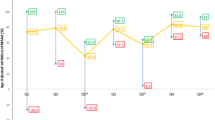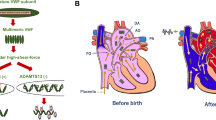Abstract
The current study was initiated to determine the prevalence of activated protein C (APC) resistance, factor V Leiden and antiphospholipid antibodies (APA) in Iraqi women with recurrent fetal loss (RFL), and evaluate the outcome of intervention in those with such states. For this purpose a total of 103 Iraqi women referred to a major teaching hospital in Northern Iraq with two or more consecutive fetal losses, as well as 100 age matched women with no history of fetal loss and at least one live birth were enrolled. After appropriate clinical evaluation, the enrolled subjects were tested for APA as well as APC resistance. Subjects who were APC resistant were further tested for factor V Leiden mutation using a polymerase chain reaction and reverse hybridization. Patients with documented APA and/or with APC resistance, were put on low dose aspirin with or without low molecular weight heparin during pregnancy, and followed for a minimum of 5 years. The results revealed that among patients’ group, APA were detected in 19.4 % compared to 1.0 % of the controls (OR 23.9, p = 0.00005). On the other hand, APC resistance was documented in 9.7 % compared to 1.0 % of the controls (OR 10.6, p = 0.01). Factor V Leiden was detected in 3.9 % of patients and 1 % of the controls (p = 0.38). Among 17 patients with APA available for follow up, there were 24 pregnancies, 18 of which ended with live births (75 %). While among the ten patients who had factor V Leiden or were APC resistant non-carriers, there were 13 pregnancies, 12 ended with live births (92.3 %). In conclusion, this study has demonstrated that among the enrolled Iraqi women, APA and APCR and not factor V Leiden were significantly associated with RFL, and that treatment with aspirin (with or without low molecular weight heparin) had lead to live births in 80.6 % of pregnancies.
Similar content being viewed by others
References
D’Uva M, Di Micco P, Strina I, De Placido G (2010) Recurrent pregnancy loss and thrombophilia. J Clin Med Res 2:18–22
Rai R, Regan L (2006) Recurrent miscarriage. Lancet 368:601–611
Hanly JG (2003) Antiphospholipid syndrome: an overview. Can Med Assoc J 168:1675–1682
Sedano-Balbas S, Lyons M, Cleary B, Murray M, Gaffney G, Maher M (2011) Acquired activated protein C resistance, thrombophilia and adverse pregnancy outcomes: a study performed on an Irish cohort of pregnant women. J Pregnancy. doi:10.1155/2011/232840
Exner T, Richard KA, Kronenberg H (1978) A sensitive test for demonstrating lupus anticoagulant and its behavioral patterns. Am J Hematol 40:143–151
Laffan MA, Bradshow AE (2006) Investigations of haemostasis. In: Lewis SM, Bain BJ, Bates I (eds) Practical haematology, 10th edn. Churchill Livingstone, Philadelphia, pp 443–444
Tripodi A (2007) Laboratory testing for lupus anticoagulants: a review of issues affecting results. Clin Chem 53:1629–1635
Hézard N, Cornillet P, Vallade A, Nguyen P (1997) Detection of factor V Leiden using ASO (allele specific oligonucleotide). Thromb Haemost 78:1296
Opatrny L, David M, Kalia SR, Rey E (2006) Association between antiphospholipid antibodies and recurrent fetal loss in women without autoimmune disease: a meta-analysis. J Rheumatol 33:2214–2221
Kupferminc MJ (2003) Thrombophilia and pregnancy. Reprod Biol Endocrinol 1:111
Meroni PL, Orietta Borghi M, Raschi E, Tedesco F (2011) Pathogenesis of antiphospholipid syndrome: understanding the antibodies. Nat Rev Rheumatol 7:330–339
Parazzini F, Acaia B, Faden D, Lovotti M, Marelli G, Cortelazzo S (1991) Antiphospholipid antibodies and recurrent abortion. Obstet Gynecol 77:854–858
D’Uva M, Di Micco P, Strina I, Ranieri A, Alviggi C, Mollo A, Fabozzi F, Cacciapuoti L, di Frega MTS, Iannuzzo M, De Placido G (2008) Etiology of hypercoagulable state in women with recurrent fetal loss without other causes of miscarriage from southern Italy: new clinical target for antithrombotic therapy. Biologics 2:897–902
Out HJ, Bruinse HW, Christiaens GCML, Van Vliet M, Meilof JF, deGroot PG, Smeenk RJT, Derksen RHWM (1996) Prevalence of antiphospholipid antibodies in patients with fetal loss. Ann Rheum Dis 50:553–557
Branch DW, Gibson M, Silver RM (2010) Recurrent miscarriage. N Eng J Med 363:1740–1747
Rai R, Shlebak A, Cohen H, Backos M, Holmes Z, Marriott K, Regan L (2001) Factor V Leiden and acquired protein C resistance among 1000 women with recurrent miscarriage. Hum Reprod 16:961–965
Clifford K, Rai R, Watson H, Regan L (1994) An informative protocol for the investigation of recurrent miscarriage: preliminary experience of 500 consecutive cases. Hum Reprod 9:1328–1332
Rote NS, Dotal-Johnson D, Branch DW (1990) Antiphospholipid antibodies and recurrent pregnancy loss. Correlation between activated partial thromboplastin time and antibodies against phosphatidylserine and cardiolipin. Am J Obstet Gynecol 163:575–584
Al-Allawi N, Jubrael J, Baban N, Gedeon G (2009) Thrombophilic mutations in Dohuk region of Iraq. Duhok Med J 3:25–32
Settin A, Alkasem RA, Ali E, ElBaz R, Mashaley AM (2011) Factor V Leiden and prothrombin gene mutations in Egyptian cases with unexplained recurrent pregnancy loss. Hematology 16:59–63
Behjati R, Modarressi MH, Jeddi-Tehrani M, Dokoohaki P, Ghasemi J, Zarnani AH, Aarabi M, Memariani T, Ghaffari M, Akhondi MA (2010) Thrombophilic mutations in Iranian patients with infertility and recurrent spontaneous abortion. Ann Hematol 85:268–271
Kovalevsky G, Gracia CR, Berlin JA, Sammel MD, Barnhart KT (2004) Evaluation of the association between hereditary thrombophilias and recurrent pregnancy loss. Arch Intern Med 164:558–563
Rey E, Kahn SR, David M, Shrier I (2003) Thrombophilic disorders and fetal loss. Lancet 361:1193–2000
Pihusch R, Buchholz T, Lohse P, Rübsman H, Rogenhofer N, Hasbargen U, Hiller C, Thaler CJ (2001) Thrombotic gene mutations in recurrent spontaneous abortion: prothrombin mutation increases the risk in first trimester. Am J Reprod Immunol 46:124–131
Cardona H, Castaneda SA, Maya WC, Alvarez L, Gomez J, Gomez J, Torres J, Tobon L, Bedoya G, Cadavid AP (2012) Lack of association between recurrent pregnancy loss and inherited thrombophilia in a group of Colombian patients. Thrombosis. doi:10.1155/2012/367823
Abu-Asab NS, Ayesh SK, Ateeq RO, Nassar SM, El-Sharif WA (2011) Association of inherited thrombophilia with recurrent pregnancy loss in Palestinian women. Obstet Gynecol Int. doi:10.1155/2011/689684
Aznar J, Villa P, Espana F, Estelles A, Grancha S, Falco C (1997) Activated protein C resistance phenotype in patients with antiphospholipid antibodies. J Lab Clin Med 130:202–208
Olivieri O, Friso S, Manzato F, Guella A, Bernardi F, Lunghi B, Girelli D, Azzini M, Brocco G, Russo C et al (1995) Resistance to activated protein C in healthy women taking oral contraceptives. Br J Haematol 91:465–470
Fraquharson RG, Quenby S, Greaves M (2002) Antiphospholipid syndrome in pregnancy: a randomized, controlled trial of treatment. Obst Gynecol 100:408–413
Laskin CA, Spitzer K, Clark CA, Crowther MR, Ginsberg JS, Hawker GA, Kingdom JC, Barrett J, Gent M (2009) Low molecular weight heparin and aspirin for recurrent pregnancy loss: results from a randomized, controlled HepASA trial. J Rheumatol 36:279–287
Alalaf S (2012) Bemiparin versus low dose aspirin for management of recurrent early pregnancy losses due to antiphospholipid antibody syndrome. Arch Gynecol Obstet 285:641–647
Gris JC, Mercier E, Quere I, Lavigne-Lissalde G, Cochery-Nouvellon E, Hoffet M, Ripart-Neveus S, Tailland ML, Dauzat M, Marěs P (2004) Low-molecular weight heparin versus low dose aspirin in women with one fetal loss and a constitutional thrombophilic disorder. Blood 103:3695–3699
Warren JE, Simonsen SE, Branch DW, Porter TF, Silver RM (2009) Thromboprophylaxis and pregnancy outcomes in asymptomatic women with inherited thrombophilias. Am J Obst Gynecol 200(281):e1–e5
Rai R, Backos M, Elgaddal S, Shlebak A, Regan L (2002) Factor V Leiden and recurrent miscarriage-prospective outcome of untreated pregnancies. Hum Reprod 17:442–445
Kozer E, Nikfar S, Costei A, Boskovic R, Nulman I, Koren G (2002) Aspirin consumption during the first trimester of pregnancy and congenital anomalies: a meta-analysis. Am J Obstet Gynecol 187:1623–1630
Conflict of interest
The authors declare that they have no conflict of interest.
Author information
Authors and Affiliations
Corresponding author
Rights and permissions
About this article
Cite this article
Al-Allawi, N.A.S., Shamdeen, M.Y., Mohammed, Q.O. et al. Activated Protein C Resistance and Antiphospholipid Antibodies in Recurrent Fetal Loss: Experience of a Single Referral Center in Northern Iraq. Indian J Hematol Blood Transfus 30, 364–369 (2014). https://doi.org/10.1007/s12288-014-0348-6
Received:
Accepted:
Published:
Issue Date:
DOI: https://doi.org/10.1007/s12288-014-0348-6




